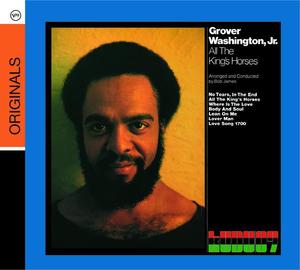
All The King's Horses
conducted by Bob James, 1939-; performed by Grover Washington, Jr., 1943-1999, Pepper Adams, 1930-1986, Arthur Clarke, Marvin Stamm, Eugene "Snooky" Young, 1919-2011, Wayne Andre, 1931-2003, Ray Alonge, Brooks Tillotson, Gene Bertoncini, 1937-, Bernard Lee Purdie, 1939-, Airto Moreira, 1941- and Ralph MacDonald, 1944-2011 (Verve Records, 2008), 32 mins
Details
- Field of Interest
- Jazz
- Conductor
- Bob James, 1939-
- Content Type
- Music recording
- Duration
- 32 mins
- Format
- Audio
- Sub Genre
- Jazz Fusion, Soul Jazz
- Label
- Verve Records
- Performer
- Grover Washington, Jr., 1943-1999, Pepper Adams, 1930-1986, Arthur Clarke, Marvin Stamm, Eugene "Snooky" Young, 1919-2011, Wayne Andre, 1931-2003, Ray Alonge, Brooks Tillotson, Gene Bertoncini, 1937-, Bernard Lee Purdie, 1939-, Airto Moreira, 1941-, Ralph MacDonald, 1944-2011
- UPC (Physical)
- 00602517822894
- Date Recorded
- 1972-05-19
- Release Date
- 2008-09-23
- Review
- Grover Washington, Jr.'s sophomore date for Creed Taylor's Kud imprint was released in late 1972. Like its predecessor Inner City Blues, this session was produced by the label boss himself and was arranged and conducted by Bob James. Assembled for the date were large horn and string sections. The former contained stalwart talents like Detroit's Pepper Adams on baritone saxophone, and trumpeters Marvin Stamm and Ernie Royal. Other players on the session included what would become the heart of the CTI session crew: guitarists Cornell Dupree and Eric Gale, bassists Ron Carter and Gordon Edwards (who only appears on the opening cut), drummer Idris Muhammad (though Billy Cobham is also here), and percussionists like Airto Moreira and Ralph MacDonald. The real star of course is the soloist. Washington's debut, Inner City Blues, had done surprisingly well -- especially since it was a date originally intended for Hank Crawford who couldn't make the scene. This time out, both Taylor and James played to Washington's tremendous strengths as an emotional player whose melodic improvising referenced everything from Motown to Stax and Volt, from Ray Charles to early James Brown and the Fabulous Flames, to Donny Hathaway, who had an uncanny knack with current pop hits. James too was discovering his own strengths in this field as a pianist and really shines behind Washington on tracks like "Where Is the Love," (written by MacDonald, actually), and Bill Withers' "Lean on Me." Washington was equally versed on both tenor and alto, and possesses two very different tones on the horns. This gave James the opportunity to color the tunes with a rather startling array of colors, shades, and textures, making the two a wonderful team. Along with the aforementioned winners are the title track by Aretha Franklin with the slow, deep blue saxophone lines accompanied by hand percussion, a tight snare and hi-hat kit rhythm, and James ghostly chords on the Fender Rhodes. But the large backdrop of horns lends so much weight to the tune it almost breaks wide open. Then there's the gorgeous -- and radical-re-envisioning of "Body and Soul," as a montage illustrated wonderfully by James impressionistic strings and woodwinds underneath Washington's bluesy take on the melody. The standard "Lover Man" is reintroduced here and includes a new interlude written by James. Washington's playing on the tune is actually reminiscent of Crawford's in feel (during his time with Ray Charles), but Washington also evokes Ben Webster in the chances he takes improvising on his solo. As if all this weren't adventurous enough, the set closes with "Love Song 1700," an adaptation from a song by classical composer Henry Purcell. Here is the genius of James at work. His love for Purcell and classical composition of this era shows up throughout his career, but the way he orchestrates strings and winds behind Washington -- who could inject pure soul into even the dullest music of Lawrence Welk -- is provocative, lovely, and haunting, even in its more overblown moments. When All the King's Horses was originally released, it wasn't received as well as Inner City Blues had been the previous year. In retrospect, however, this set has assumed its proper place in Washington's catalog: as one of his more ambitious and expertly performed sessions. ~ Thom Jurek, All Music Guide
- Subject
- Jazz, Music & Performing Arts, Jazz Fusion, Soul Jazz, Jazz Fusion, Soul Jazz
- Keywords and Translated Subjects
- Jazz Fusion, Soul Jazz
